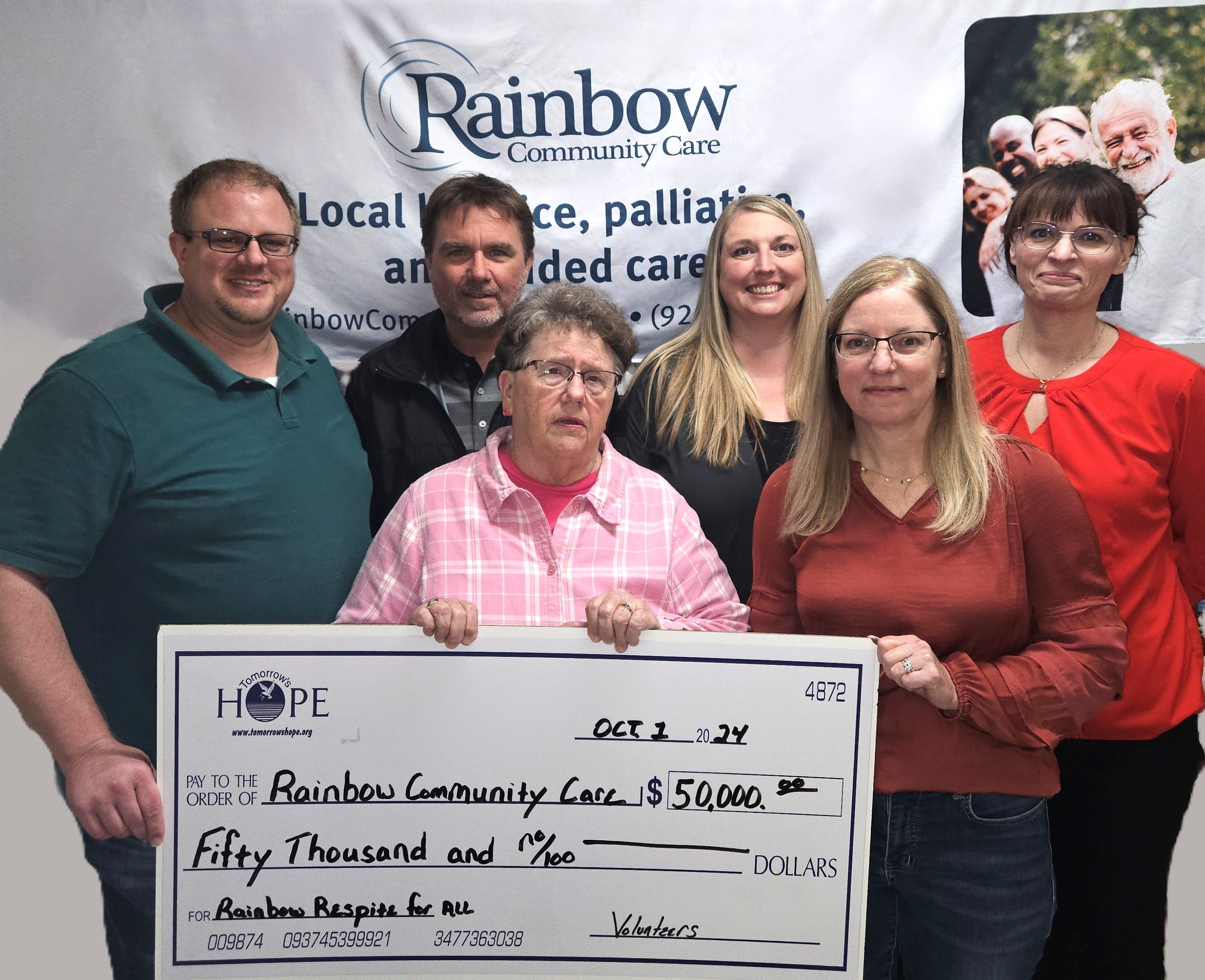Rainbow Awarded Grants for Community Respite Program

Rainbow was recently awarded a $50,000 grant from Tomorrow's Hope, Inc.'s Barb Endl Grant Program to help with startup funding for a Community Respite Program. Pictured in the back row are: Michael Maier (Rainbow's Chief Financial Officer), Todd Wiedenhoeft (Executive Director, Tomorrow's Hope), Kate Stauffacher (Rainbow's Senior Director of Innovation), and Carol Brown (Rainbow's President/CEO). In the front row are members of Tomorrow's Hope Board of Directors, Carolyn Neibler and Tammy Garlock.
For nearly 35 years, Rainbow Community Care has served patients and families throughout Southern Wisconsin. Now the organization hopes to expand its service offerings with a community respite program.
Rainbow recently received $50,000 from the Tomorrow’s Hope, Inc.’s Barb Endl Grant Program to help with startup funding, such as hiring staff, training, acquisition of supplies and equipment, and certifications for an adult day center. Respite Care of Wisconsin (RCAW) also contributed $25,000 as part of their StartUP Respite Grant program. Rainbow provided a brief glimpse of plans for a respite program during its golf outing and live auction in July. At the event, it raised $16,900 for the project, ensuring Rainbow Respite can become a reality.
“We are extremely grateful for all the support we have received from Tomorrow’s Hope and the RCAW in helping us develop a respite program,” said Rainbow Community Care President & CEO Carol Brown. “We can’t thank them enough for their help in building a program that will be sustainable and have a direct impact on families in our local communities.”
Since rebranding and sending its roots deeper into Dodge and Jefferson counties, Rainbow has seen an unprecedented burden for caregivers. Over 53 million Americans currently serve as unpaid family caregivers, which represents one in five adults. That number has grown by 9.5 million in five years. Rainbow continues to explore ways it can provide support, relief, and resources to caregivers in the community and help them avoid caregiver burnout.
“Rainbow Community Care is deeply aware of the critical role caregivers play and the unique challenges they face,” Brown said. “Through our daily work with patients and caregivers in our existing programs, we see firsthand the physical, emotional, and financial toll that caregiving can take.”
Caregivers dedicate a great amount of time and commitment to caregiving and often balance this with a full-time job, family, children, and other responsibilities. This leads to a greater risk of caregiver burnout. Respite care allows family caregivers a brief pause from their continuous task as a caregiver while their loved one is cared for at home or adult day services in a safe, caring, supervised environment outside the home. While Rainbow wants to continue to provide extraordinary care to patients, it also knows it is equally important to offer support to family caregivers who wrap their arms around their loved ones each day.
Rainbow wants to continue improving the quality of life for both chronically ill individuals and their caregivers. Through this new respite program, the organization can offer quality care, support, and companionship to those who need assistance and supervision and help alleviate the isolation and loneliness that many experience. The program is still in its initial planning stages but would serve the elderly population suffering from physical or cognitive disabilities. Rainbow’s respite care program would provide in-home or adult day services or a combination of both while offering caregivers flexible options that are tailored to individual needs.
“By creating a model that provides relief for caregivers, we hope to improve well-being for both caregivers and those they care for and help to reduce stress and the burdens they face,” Brown said.
Respite care could also include personal care assistance with daily living activities such as dressing, bathing, or medication management, along with socialization and recreational activities tailored to individual needs and interests. The Tomorrow’s Hope and RCAW grants would also help fund a nurse navigator who can help family caregivers apply for scholarships through their local Aging and Disability Resource Center (ADRC) or Alzheimer’s Association and help them locate and utilize other educational resources and support groups.
“Our planned program would explore sustainable and affordable options for respite care, with a commitment to making services accessible to all, regardless of income,” Brown said.
With this program, Rainbow hopes to partner with other local organizations to enhance resources and create a network of coordinated care solutions, creating a system that caregivers can trust and depend on when they need it the most. Offering a break from caregiving could also help prevent burnout and allow caregivers to continue supporting their loved ones longer.
“Potential respite services would allow loved ones with the opportunity to remain in their homes and communities and contribute to a more meaningful quality of life,” Brown said. “It would also give caregivers relief and comfort knowing their loved ones are being taken care of when they’re not with them.”